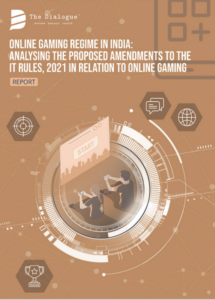Online gaming has seen tremendous growth over the past three to four years. The fact that about 433 million of the 846 million1 (~60%) of the Indian internet users are engaged in online games, shows a tremendous growth of the industry which parallels the rapid penetration of smartphones and internet. This rise has been positively recognised across sectors, so much so that the International Olympic Committee (IOC), addressed the calls for recognising the field of virtual sports and have come up with the concept of the Olympic Virtual Series. In fact, the Indian Team recently won the bronze medal for the DOTA tournament at the Common-wealth Games and a gold medal at the 42nd Chess Olympiad that was held online. This shows the talent pool that the country has and can help put India on the map in online gaming. The industry also presents a signif-icant opportunity to catalyse economic growth in the country. According to a report by IAMAI2, the gaming industry has a total inflow of FDI worth $2.7 billion and contributed Rs 2,200 crore worth of GST in 2022. With an estimated market size of US$8.6bn (by 2027)3, it has the potential to create more than 12,0004 job oppor-tunities in the gaming and allied sector. The Hon’ble Prime Minister also recognised the vast potential of the Indian gaming industry, while applauding the contributions of Indian innovators and application developers.5
Therefore, in its first effort to regulate the sector, Animation, Visual Effects, Gaming and Comic (AVGC) Pro-motion Task Force was set up after the Hon’ble Finance Minister had introduced the need for the task force in her 2022-23 Union budget speech.6 The task force submitted its first report highlighting a roadmap for the promotion of the AVGC industry.7 Further, in May 2022, MeitY also constituted the Central Inter-Ministerial Task Force to understand the regulatory landscape and recommend changes towards online gaming in India.
However, as is the case with any nascent industry, the sector is currently riddled with regulatory uncertainty that would impede its growth potential and adversely affect user interests. Till date, state governments have been making individual laws on online games which involve real money under the assumption that they are games of chance. They derive this power from Entry 34, List II, Schedule VII of the Indian Constitution8 which makes betting and gambling as state subjects. However, the Supreme Court over the years has adjudicated that games which involve a certain degree of skill cannot be classified as games of chance. The Indian courts have developed a distinction between games of skill and games of chance over the past 70 years. Games of chance are considered to have a close association with betting and gambling and are, therefore, under the jurisdiction of the state.
In order to bring more coherency in the policy making within industry, The Dialogue has been actively working towards building academically backed policy-making in the online gaming industry over the past few years. We have published white papers and held multiple roundtables over the past three years.
The Dialogue published a white paper on regulation of fantasy sports in India, which identifies challenges in the regulatory regime, and examines consumer challenges and potential for self-regulation. The report also analyses global practices and makes recommendations for a more enabling regulatory ecosystem in India. The Dialogue has also been engaging at the central and the state government levels to suggest best practices for the regulation of the industry. At the state government level, The Dialogue submitted its representation to the governments of Rajasthan and Tamil Nadu.
In the latest development, after being appointed as the nodal ministry for online gaming, the Ministry of Electronics and Information Technology (MeitY) proposed amendments to the Information Technology (In-termediary Guidelines and Digital Media Ethics Code) Rules, 2021.10 It was a welcome move as it provided much-needed legislative legitimacy for online games of skill to operate in the country. Throughout the con-sultative comments process, MeitY held multiple roundtables and discussions to understand key issues and stakeholders’ proposed changes throughout January 2023. Towards this, The Dialogue conducted a round table with more than 75 participants from diverse backgrounds and on the basis of the inputs received, desk research submitted its detailed comments on the proposed amendment.
PUBLICATION DATE
March 15, 2023
TO READ FURTHER, DOWNLOAD THE ANALYSIS HERE
